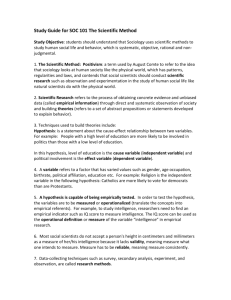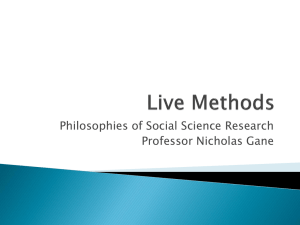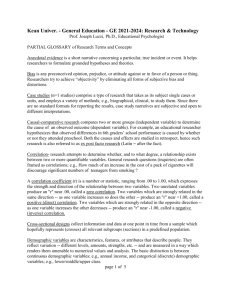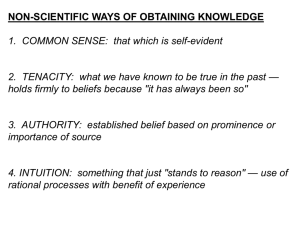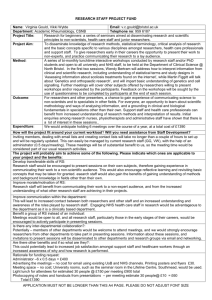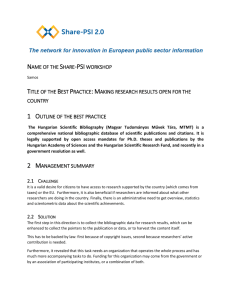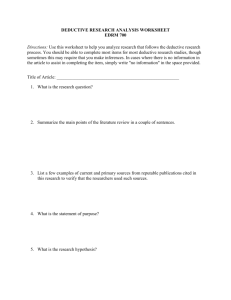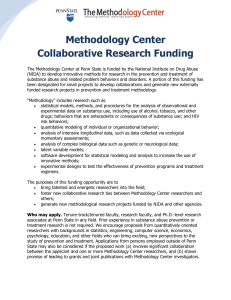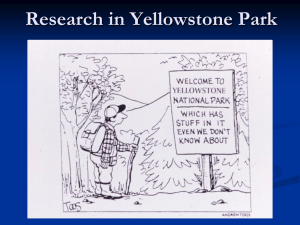Theory and research
advertisement
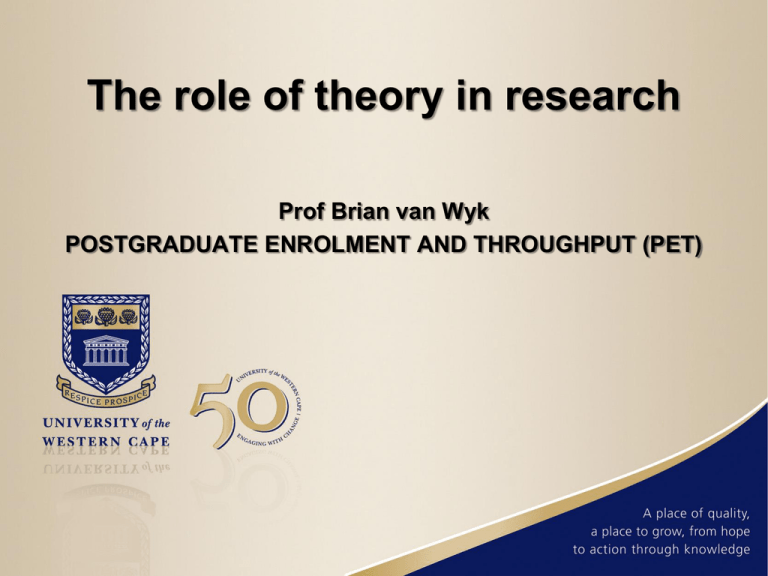
The role of theory in research Prof Brian van Wyk POSTGRADUATE ENROLMENT AND THROUGHPUT (PET) Outline for workshop • What is theory? • Characteristics of theory • Functions of theory in research • How to evaluate the quality of a theory (explanation) • Theory in research OR research and theory? What is theory? • A model or framework for observation and understanding – – shapes both what we see and how we see it; allows the researcher to make links between • • • the abstract and the concrete, the theoretical and the empirical, thought statements and observational statements. • Generalising statements that assert a connection between two or more types of phenomena • Explains and predicts the relationship between variables • A system of interconnected abstractions or ideas that condenses and organises knowledge about the world Characteristics of theory • Theory guides research and organises its ideas. – i.e. bricks lying around haphazardly in the brickyard: ‘facts’ of different shapes and sizes have no meaning unless they are drawn together in a theoretical or conceptual framework. • Empirically relevant • Always tentative, never proven • Becomes stronger as more supporting evidence is gathered; provides a context for predictions • Has the capacity to generate new research. Theory vs. hypothesis • An hypothesis is an educated guess. It usually predicts the relationship between two or more variables. • Hypotheses are more specific than theories. • Multiple hypotheses may relate to one theory. Remember theory can operate on different levels • Micro-level theory seeks to explain behaviour at the level of the individual or family environment – e.g. psychology – Frustration-Aggression hypothesis or Sternberg’s theory of love • Meso-level theory seeks to explain the interactions of micro-level organisms – e.g. social institutions, organisations, communities • Macro-level theory seeks to explain behaviour at the level of large groups of people – e.g. ethnicity, class, gender – Conflict Theory How to evaluate a theory • • • • • Is the theory or explanation logical and coherent? Is it clear and parsimonious? Does it fit the available data? Does it provide testable claims? Have theory-based predictions been tested and supported? • Has it survived numerous attempts by researchers to identify problems with it or to falsify it? • Does it work better than competing or rival theories or explanations? • Is it general enough to apply to more than one place, situation, or person? • Can practitioners use it to control or influence things in the world – – a good theory of teaching helps teachers to positively influence student learning; a good theory of counseling helps counselors to positively influence their clients’ mental health Theory and research OR theory in research? • There is a two-way relationship between theory and research. • Social theory informs our understanding of issues, which, in turn, assists us in making research decisions and making sense of the world. • The experience of doing research and its findings also influences our theorising. Deductive theory • Empirical results affect the way theory is expanded and altered. In a deductive approach, researchers use theory to guide the design of a study and the interpretation of results. As researchers continue to conduct empirical research in testing a theory, they develop confidence that some parts of it are true. • Researchers may modify some propositions of a theory or reject them if several well-conducted studies have negative findings. Inductive theory • Inductive theorising begins with a few assumptions and broad orienting concepts. Theory develops from the ground up as the researchers gather and analyse the data. Theory emerges slowly, concept by concept, and proposition by proposition, in a specific area. Over time, the concepts and empirical generalisations emerge and mature. Soon, relationships become visible and researchers weave knowledge from different studies into more abstract theory. Home Task • • • • • • • • Formulate your key research question: what are you ultimately trying to answer? What are some of the sub-questions to this bigger question? Attempt to provide a response or explanation for your bigger research question as well as the sub-questions. Think about what it is that you are drawing on in developing these responses. Develop a list of factors that have influenced your response. Ask your partner to ‘critique’ and point out any assumptions in your response. Do you need to research any of these assumptions before you can proceed with addressing your research question? What level of explanation do you think will be most appropriate for researching your topic? (micro, meso, macro) Will you be trying to explain causal links? Or people’s own meanings (phenomenological)? Or historical developments? Have you read any books or journal articles which could support and help you to develop your argument? If so, which? Were these authors working in similar or different contexts to you? Are there any theorists who refute your arguments or take a different perspective? If so, who? Do they work in similar or different contexts to you?
